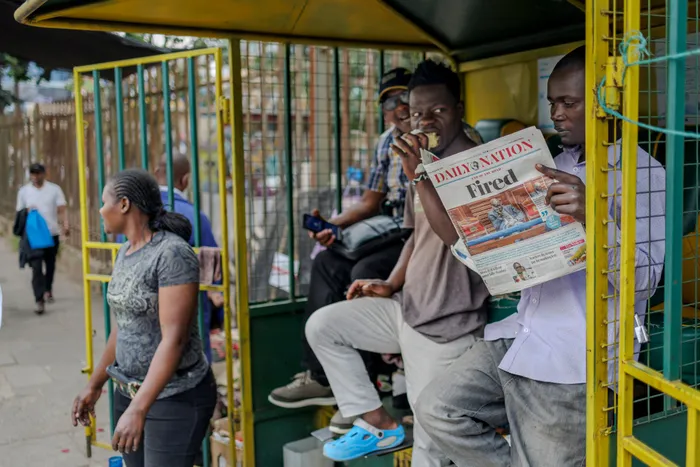Ruto, Gachagua fallout masks Kenya’s political and economic distress

A STREET vendor reads a local daily newspaper, The Nation, headlined 'Fired' following the impeachment by the Senate of former Deputy President, Rigathi Gachagua in Nairobi on October 18, 2024. Kenya has a long history of fallouts between presidents and their deputies, says the writer. Picture: Tony KARUMBA / AFP)
Dr. Sizo Nkala
KENYA has been the scene of a seemingly unending political drama in recent months. From deadly protests in July and the subsequent mass dismissal of the cabinet by President William Ruto to the unprecedented impeachment of Vice President Rigathi Gachagua on October 17 by the legislature.
Gachagua, who was President Ruto’s running mate in the 2022 elections, faced several accusations including corruption, money laundering, inciting violence along tribal lines, undermining the authority of the government, and abuse of office among others. The Vice President is a rich and influential politician hailing from Kenya’s central region predominantly by the Kikuyu people who make up the country’s largest tribe. He played a vital role in getting Ruto elected president.
Both houses of the Kenyan legislature, the National Assembly (282 out of 326 votes) and the Senate (54 out of 67 votes) overwhelmingly in support of the impeachment motion. It was the first time a sitting deputy president was removed from office since the introduction of the impeachment law in 2010.
The latest drama is the culmination of a long-drawn fallout between the Ruto and Gachagua camps who traded accusations of acting in bad faith. Gachagua’s people complained of being marginalized in the government and important events and decisions. The Ruto camp accused Gachagua of supporting the July protests which forced the president to the unpopular Finance Bill and called for his impeachment and resignation.
There were also accusations to the effect that the vice president’s condemnation of the National Intelligence Service citing its failure to anticipate and stop the protests amounted to undermining of state security. Ruto proceeded to nominate the Interior Minister, Kithure Kindiki, as Gachagua’s replacement immediately after the latter’s impeachment. Kindiki’s nomination was swiftly approved by both chambers of the legislature within a few hours.
However, the Vice President’s legal team launched an appeal to the High Court arguing that the impeachment process had been hurried and unfair. The High Court admitted that Gachagua’s application raised fundamental constitutional issues and ordered that Kindiki’s nomination be set aside until the case is heard. The Court is scheduled to hear Gachagua’s case on October 24.
However, it is very unlikely that a judicial process will salvage Gachagua’s political career. Even if the Court nullifies the impeachment because it was procedurally invalid, the process can always be redone with the same speed.
Kenya has a long history of fallouts between presidents and their deputies. All of Kenya’s post-independence presidents – Jomo Kenyatta, Daniel Arap Moi, Mwai Kibaki, Uhuru Kenyatta, and now William Ruto – had spats with their deputies which in most cases effectively ended their political alliances. As such, the latest spat between Ruto and Gachagua is something that Kenyans are accustomed to.
There are several competing factors that may explain the decision to remove Gachagua from his office. This includes, most importantly, the changed political context. Ruto and Gachagua formed a marriage of convenience leading up to the 2022 general elections by forming the Kenya Kwanza coalition headed by Ruto who opted for Gachagua as his running mate because of his ability to mobilize the grassroots and represent the interests of the poor.
Gachagua also brought the Kikuyu vote without which Ruto could not secure the presidency. The Kenya Kwanza coalition squared up against the Raila Odinga-led Azimio coalition. Raila Odinga’s coalition bitterly disputed the election outcome which saw the Ruto-led emerge victorious with a slim majority.
However, Ruto and Odinga have since made up and become political allies which saw him appointing several Azimio heavyweights to ministerial positions in a reconstituted cabinet in July. President Ruto has also given his full backing for Raila Odinga’s candidature for the chairperson of the African Union Commission (AUC).
Having secured Odinga’s support, Ruto had little use for Gachagua whose frequent populist statements betrayed an ambition to build a political base of his own. As such, Ruto, who intends to stand for re-election in 2027, may have felt threatened by his deputy and decided to act to neutralize the threat by supporting Gachagua’s impeachment.
Moreover, the latest political manoeuvres will not reverse the Ruto government’s declining public support which was manifested by the July protests. The move to impeach the deputy president, who was already marginalized in the government machinery, does not help the government find solutions to the problems of poverty and unemployment afflicting the Kenyan masses.
It would be wise for the Ruto administration to expend more energy addressing bread and butter issues than plotting against perceived political competitors.
* DR SIZO NKALA is a Research Fellow at the University of Johannesburg’s Centre for Africa-China Studies.
** ** The views expressed in this article do not necessarily reflect the views of The African.
Related Topics: